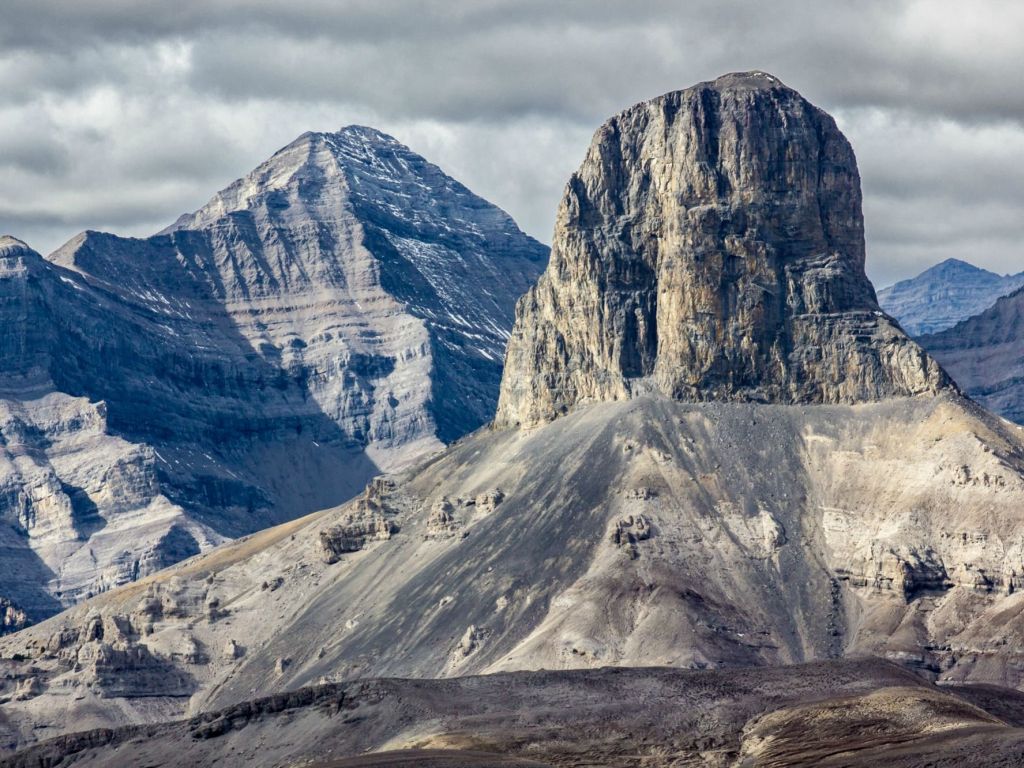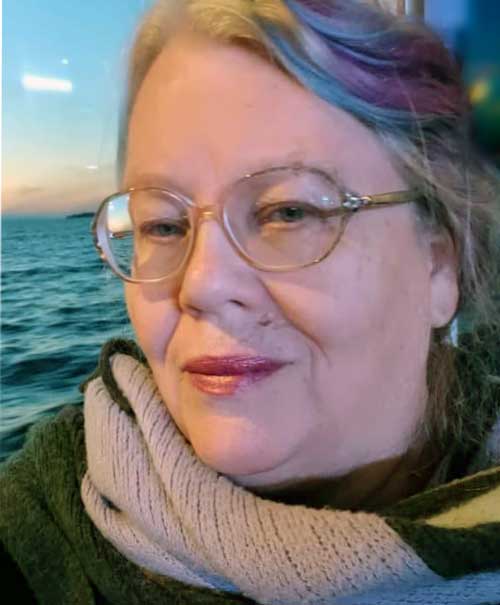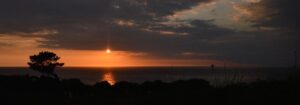This poem expresses an emotional state known as Clanalas, which expresses the genetic memory of unresolved grief and memories of loss.

Looking Toward the Devil’s Head Mountain from a Hilltop East of Sundre, Alberta
Dedicated to Stan Ghostkeeper, a School Friend from Sundre.
We never forgot You, the Stoney Nakoda
who were here before.
This wintering ground
time out of mind
your place, this soil
wise and tender deer seldom seen, but sensed
quietly shadowing the dawn
secretive, still searching for you.
Their stillness entered us
yet clings close to our hearts
in this land of speaking wind
curling grass with roots so deep.
The land where we lived, your land. Beauty
brought instant worship to our breath, every day
the colors. Never were we blind nor dull
to your leaving. Your beauty was one with surrounding earth.
We knew the land never forgot you.
We heard clearly the murmurs in the wind.
How lonely we lived, how we missed you
hungering, as we were
so close to your wells of joy, the
wild abandon of your songs and dances.
We brought only empty cups to dip.
Our lands in Europe were lost to us, and so we came.
Every day when we looked upward
the open sky challenged us. Asked,
“Who the hell are you? You don’t belong here!”
Each night we watched the starlight fall
into the mouths of howling coyotes
how they mourned for you, opened their souls
roamed the night spaces
searching, their paws tender, careful
quiet, bellies close to the ground
clenched with hunger for you
throats pouring out
thirsty songs. If they sang long enough –
loud enough would you return? Your songs still echo
from every sky, every tree, every stone.
Children never born still call your name
in the night spaces when their ancestors dream of them
trying still to bring them home.
When the dreams come I plead with you: Hear our shame.
We knew the land was stolen from
your ancestors, your songs, your dances, your honour.
We knew you held true.
You took your honour with you when you left.
Did you scatter down just a little for us
as we gazed through our own despair
into the wandering night sky? We too
were broken by the British crown.
I sorrow with my ancestors
and you with yours. Your children.
I have no song lent
to me by any eternal being,
no god to show me how to save myself from
shame or regret. Except to tell you,
“I know. With you I remember. And I am sorry, so, so sorry.
We became their tools of destruction.”
They made us homeless too.
They broke us. A thousand years of battle.
We fought them. The Picts. The Scots. The Irish. The Celts.
We, the indigenous of the northlands, Caledonia
They named our land Hibernia.
I hold in my body the genetic lines of the indigenous Picts
through my mother. Kenneth MacAlpine, KIng of the Picts.
I sing as the bards of old, though my throat is dry
I have no longer the magic of the harp to charm,
to sing the earth now, still we weep and dream of
rebellion. We hope to soon walk out of their grasp.
This generation will do it. Break free.
Back then, blood poured out of our veins
until, spent, we could hold them back no more.
They emptied us of our stories and songs.
Stole our tongues, our land.
Poured over our borders with fire and
despair. Left us homeless, tied our grazing and hunting lands
to their smoking blast-houses, their brick caves of the damned.
The hills of Scotland they turned to sheep for wool
to feed the misery of their churning black industry.
Even the moths changed color, turned black
from sucking in their smoke.
The lands are still empty of folk, hand-built stone crofts
crumbled. So many gone. But memory holds fast.
Fields, mountains stones remember.
Reach for us.
I returned to Mull, I wept there
saw your stolen pines, the
Lodgepole Pines from the Rockies
torn away from Alberta, I found them
swaying, the wind mourning
the blackened moths
lifting their grief across Moray and Fife,
along the River Findhorn
the River Clyde, the Waters of Leith
on their shallow roots. I followed their march
all the way westward across Mull.
But they could not cross the water to come home.
The British dogs (we called them dogs)
took the Lodgepole and planted them
on the deserted hills of Scotland
thinking they’d grow straight, fast, cheap
tall masts just right for white-sailed ships.
The pines, slaves captured from Nakoda lands
brought to Scotland. Those ships no longer sail.
The trees grow without heart. They
break and fall when winter storms come
across the cold, grey, North Sea.
When I stand beneath them I hear their lonely
songs of displacement and despair. The pines
look back toward you. They hear you. They know.
What did we bring to you from our broken lives?
Only scraps of the homeland lost to us,
bannock, the recipe from my grandmothers.
My father remembered; he made it fresh every morning
with strong black tea. But with flour of wheat, not oats or barley.
Bannockburn, in Scotland, was
in 1314, a great battle, a victory
we won over the dogs.
But no matter how many times we fought
it was never enough to stop them.
We brought to your place, this place, only shattered memories of
our beloved home. Names only, lightly carried, came with us.
Calgary, Morningside, Red Deer, Edmonton.
At the school in Sundre when I was a girl
there was one, an Old Ghost, a Cree, who
wandered along beside me. Silent always.
Never speaking
kept my spirit, held me close.
Without him I had not a friend anywhere.
The light of his many generations shone into mine.
Why couldn’t we make a home together?
When will we learn?
When can we make ourselves, all of us, many homes together?
Notes:
During the 1800’s moths in England darkened their pigmentation in order to blend in better as the skies filled with the smoke of coal fires; an example of adaptation to environmental change.
Palliser report – John Palliser, Irish born, wrote in his report that much of Alberta and Saskatchewan was unsuitable for British settlers due to climate but they ignored his recommendations.
Lodgepole pine, indigenous to Western Alberta and the Rocky Mountains, tall, straight trees with most branches clustered near the tops.
Coyotes, wild, indigenous dog related creatures that howl every night.
Pict descendants have applied to the UN for status as the only white indigenous; Kenneth MacAlpine, King of the Picts is my ancestor.
A Scottish independence movement has been active for hundreds of years. The Scots still intend to re-establish their own separate government and their own border.
Received a letter from a friend in Ireland full of anguish and worry. . .in 2020.
Bannockburn: A village in Stirling where there was a great victory over the British in 1314. “Burn” is the Scottish for small stream of water.
Bannock: In traditional northern Scottish cooking, a flat unsweetened cake made with oatmeal or barley flour, unleavened; now often made with wheat flour and served with herring, fresh butter and strawberry jam. The likes of David Thompson and Simon Frazer brought the bannock from Scotland to Alberta with them and taught the indigenous to make it. Now, the tribal bands in Canada name bannock as belonging to their native heritage. They don’t believe me when I tell them it was the Scots who brought it here to their campfires..
Calgary, named after Calgary Castle on the Isle of Mull, a safe harbour, a green pasture.
Edmonton, Edmund is a Scottish name meaning “prosperous protector”.
The British crown practiced the methods of butchery and colonialism on us: Outlawed our music, dances, language, traditional dress; took over education. Killed us by the thousands with musket, sword and famine.
Irish famines: 300 years of famine, the produce of Irish farms was shipped to England while at least 2 million Irish died of famine. Genocide. My family departed for North America in the mid-1800s




